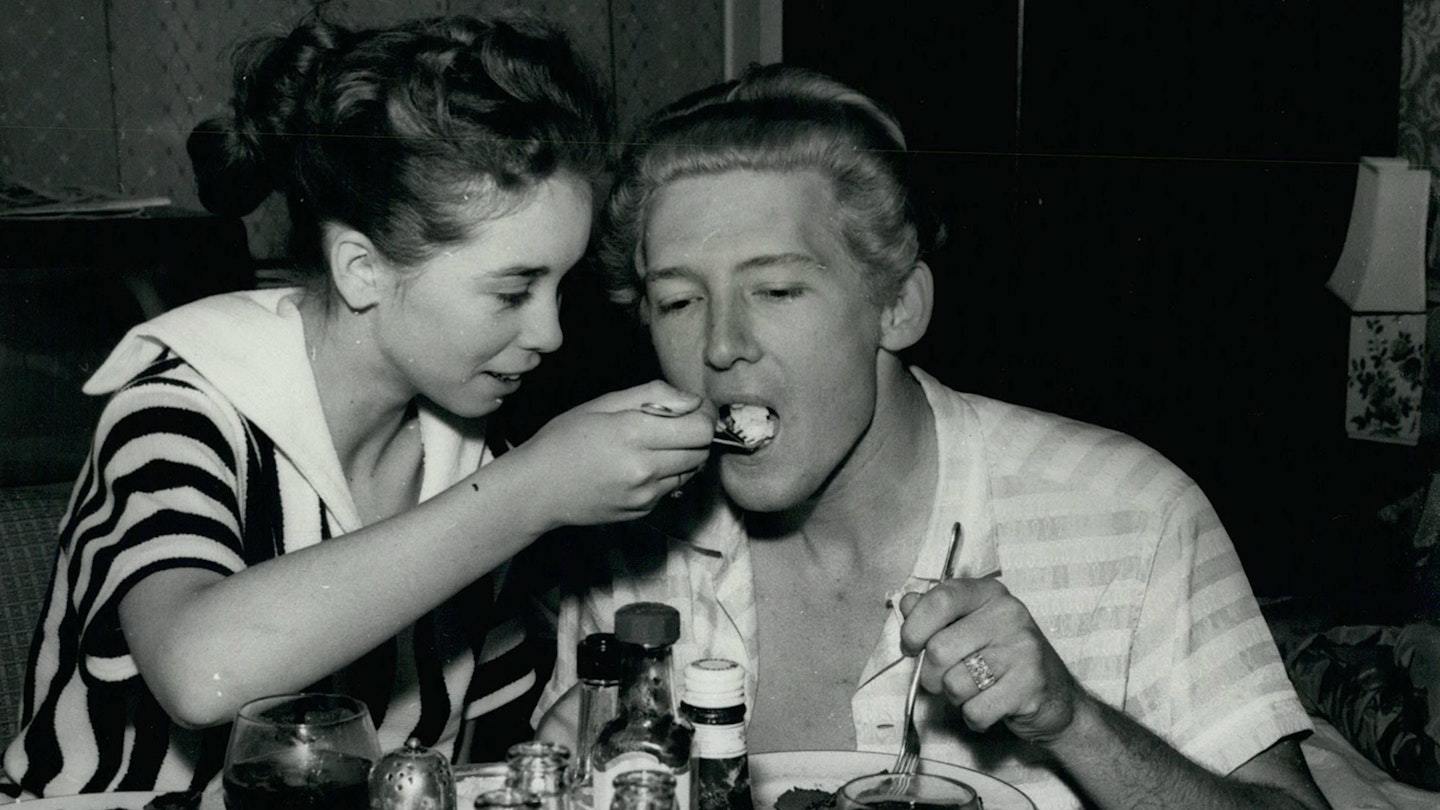27 June
JERRY LEE LEWIS HAD RETURNED TO MEMPHIS following a May 1958 tour debacle in Britain. The revelation: he was married to 13-year-old Myra Gail Brown, his first cousin once removed. The scandal resulted in his departure from the UK after just three dates of a 71-show tour. “Baby Snatcher Quits” proclaimed one headline: the news that he’d been married twice before, once when he was 14 and later, bigamously, at 16, inflamed the British press further.
Heading back to Tennessee, where they understood such marriages, seemed the sensible thing to do. But things had changed. Sam Phillips at Sun Records was alarmed at how volatile the situation had become, fearing that Lewis – who’d notched such massive-selling records as Whole Lot Of Shakin’ Going On, Great Balls Of Fire and Breathless during his first months with the label – may not survive the backlash. Though Jerry Lee’s current single, High School Confidential, had been raised high in the charts because of his starring role in the film of that title, he’d not been able to cash in on its full impact and had ignored the film’s New York premiere on the journey home.
Things were falling apart all around Lewis. His first wife, Dorothy, threatened he’d never see his son again. His new wife Myra’s parents were telling the press they were unsure about the validity of their daughter’s marriage. Another ceremony was hastily arranged for June 4 in Jerry’s birthplace, Ferriday, Louisiana, a Methodist minister officiating.
“I can cry and wish all I want to but I can’t control the press.”
jerry lee lewis
Back in Memphis, Sam Phillips talked things over with Jerry Lee and it was decided that they would take out a full-page advertisement in Billboard on June 9, written in the form of an open letter.
“This whole thing started because I tried and did tell the truth,” the somewhat uncharacteristic missive began, before reiterating the circumstances of his second divorce. He concluded by saying, “I hope that
if I am washed up as an entertainer it won’t be because of this bad publicity because I can cry and wish all I want to but I can’t control the press or the sensationalism that these people will go to to get a scandal started to sell newspapers.”
Not that Sam Phillips was passing up any opportunity to promote Sun Records. He promptly released The Return Of Jerry Lee, a novelty cash-in single, dreamt up by Jack Clement. It featured Memphis DJ George Klein posing a number of questions that were answered by segments culled from Jerry Lee’s previous recordings.
“What did Queen Elizabeth say about you?” asked Klein at one point. Jerry’s spliced-in answer? “Goodness gracious – Great Balls Of Fire!” “We think it’s a cute record,” said Phillips.
On June 11, Jerry Lee made his first attempt to get his career going again with the first of two shows scheduled for New York City’s Cafe de Paris. Few customers turned out, and the Big Apple’s press duly picked up where the British press had left off. After just one performance, Jerry Lee returned home. His final hit of ’58 seemed to say it all. It was titled Fools Like Me.
Though Jerry Lee remained under contract to Sun, he ceased recording for a while, as the five-figure fees for concerts slipped to one hundred dollars-a-night appearances in minor clubs and beer joints. Dick Clark, in what he later agreed was “a cowardly act”, dropped Jerry Lee from his show and many other DJs refused to play his records. Only Alan Freed continued to do so, until the payola scandal put paid to his own on-air activities.
It wouldn’t be until April 1961, and a US Top 30 single with a cover of Ray Charles’s What’d I Say, that Lewis’s career again began moving in an upward direction. In April 1962, he visited Britain once more for two dozen dates, playing venues including the Wigan Empress, the Grimsby Gaiety and the Mitcham Majestic, and astounded those fortunate enough to witness his return.
Incredibly, Jerry Lee played the shows just a week after the tragic death by drowning of his infant son, Steve Allen Lewis. In the 2014 book His Own Story, the raised-Christian singer mused to writer Rick Bragg, “Why did this happen to me? I don’t understand. But I will understand someday.”
Staying true to rock’n’roll when those around him had thrown in the towel – as he’d so blisteringly prove on 1964’s album Live At The Star-Club, Hamburg – he’d survived. Just.
